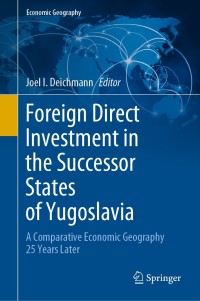Buy Foreign Direct Investment in the Successor States of Yugoslavia: A Comparative Economic Geography 25 Years Later 1st Edition PDF ebook by author Joel I. Deichmann – published by Springer in 2021 and save up to 80% compared to the print version of this textbook. With PDF version of this textbook, not only save you money, you can also highlight, add text, underline add post-it notes, bookmarks to pages, instantly search for the major terms or chapter titles, etc.
You can search our site for other versions of the Foreign Direct Investment in the Successor States of Yugoslavia: A Comparative Economic Geography 25 Years Later 1st Edition PDF ebook. You can also search for others PDF ebooks from publisher Springer, as well as from your favorite authors. We have thousands of online textbooks and course materials (mostly in PDF) that you can download immediately after purchase.
Note: e-textBooks do not come with access codes, CDs/DVDs, workbooks, and other supplemental items.
eBook Details:
Full title: Foreign Direct Investment in the Successor States of Yugoslavia: A Comparative Economic Geography 25 Years Later 1st Edition
Edition: 1st
Copyright year: 2021
Publisher: Springer
Author: Joel I. Deichmann
ISBN: 9783030557393, 9783030640422
Format: PDF
Description of Foreign Direct Investment in the Successor States of Yugoslavia: A Comparative Economic Geography 25 Years Later 1st Edition:
T?his edited volume offers a descriptive analysis of foreign direct investment (FDI) flows and cumulative stock, industrial composition, and important spatial trends for each successor state of former Yugoslavia: Bosnia & Herzegovina, Croatia, Kosovo, Montenegro, North Macedonia, Serbia, and Slovenia. The chapters are written by academic experts on the topic from each of these countries and are organised systematically in order to facilitate comparison between the states. The aim of this book is to advance scholarly knowledge about FDI in Southeastern Europe 25 years after the dissolution of Yugoslavia. Each chapter includes a summary of scholarly contributions published on the topic in English-language and local language journals, a discussion of origins, composition by industry, and location choice within the country from 1995-2018, using Dunning’s (1980) eclectic paradigm as a discussion framework. The chapters conclude with prospects for FDI over the next twenty-five years with emphasis on economic growth projections, EU integration, and other relevant country-specific considerations the local authors deem relevant. Special attention is given to specific companies operating in Yugoslavia prior to its breakup and how these firms have been impacted by dissolution, recession, efforts toward European Union membership. The authors also examine the past and potential impact of FDI from unforeseen events such as the Global Financial Crisis and COVID-19. This book appeals to scholars of geography, international business, economics, and economic history of the former Yugoslavia as well as professionals working in the region and on related topics elsewhere.





